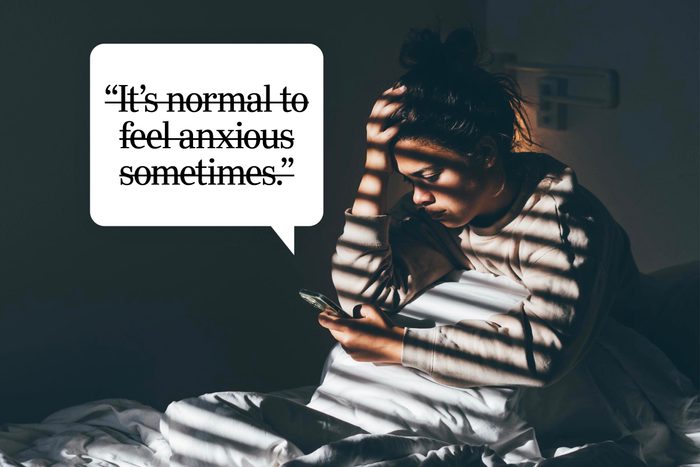
How you talk about mental health matters
TikTok, Instagram, Facebook and the like are full of people talking about mental health—both those who are experiencing mental-health challenges and experts with letters after their names. This increased awareness is great for changing the conversation around mental health, being more open about these common issues and helping us learn how to be happier, but when these conversations are done wrong, they can hurt the very people they are meant to help as choosing what to say when someone is depressed can be tricky.
“Language, regardless of whether it’s used on social media or in person, is power,” says belonging and leadership expert Ritu Bhasin. “There is an epidemic of stigma around mental illness, and the way we speak about it has the power to either reinforce that or break it.”
Even if you’re trying to discuss mental health with care and you would never use flat-out offensive terms, navigating this topic can still be difficult. In fact, some of the “polite” things you may be saying are not as polite as you think they are. So how do you avoid this minefield? After all, the etiquette rules aren’t clear, and they’re different than the rules for even other tricky topics like aging and disability. We asked experts and real-life people with mental-health challenges to share what they wish you wouldn’t say—and what to say instead.
Get Reader’s Digest’s Read Up newsletter for more etiquette tips, humor, cleaning, travel, tech and fun facts all week long.
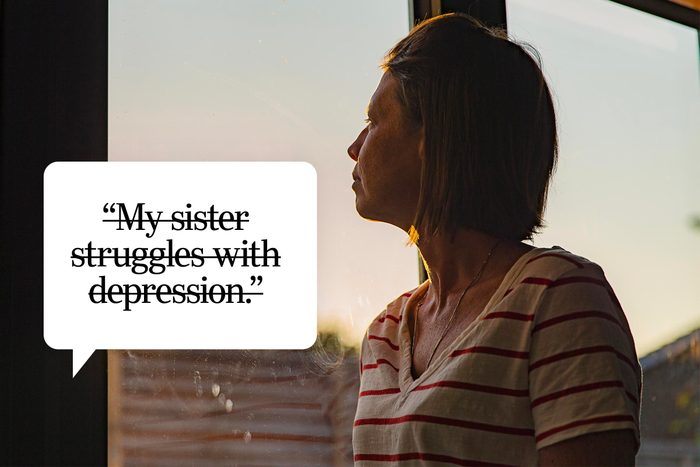
Saying that someone struggles with a mental-health issue
“The word struggling carries a very negative connotation, and the truth is, you don’t actually know what someone else’s journey with their mental health is like,” says Bhasin. Sometimes mental health can feel like a struggle, but don’t assume that—let them tell you how they are feeling, and then use the word or words they choose during your talk.
Amy Alexander, a 31-year-old who has lived experience with clinical depression, agrees: “Struggling makes it sound like it’s something I can overcome or fight against, but in reality, depression is just something I live with. Some days it’s better, some days it’s not, but if you sincerely ask, I will tell you.”
Say this instead: “My sister has lived experience with depression.” Or if you’re talking to someone with issues of their own, try: “Are you experiencing depression right now?” This change acknowledges the wide range of experiences people have with mental-health challenges, says Bhasin. And if you do make a mistake? It’s not the end of the world—here’s how to apologize.
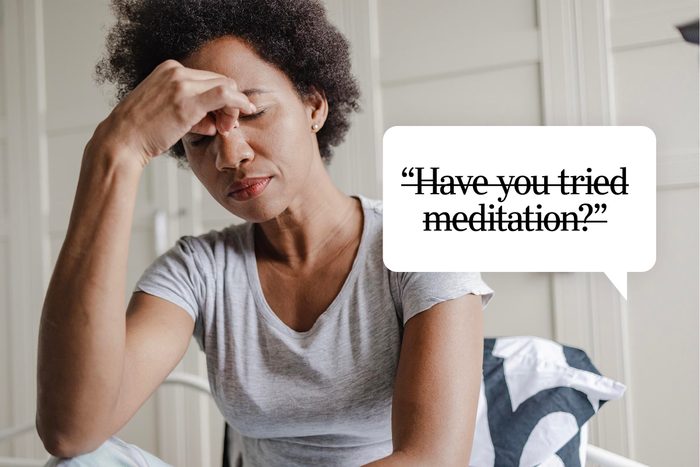
Offering unsolicited advice
We know, you’re trying to be helpful, particularly if you’ve dealt with similar issues. But unless someone has specifically asked you for advice, your “helpful tips” are more likely to make them feel frustrated or like you aren’t really hearing them. And feeling heard is one of the things people with mental-health challenges crave the most, says psychiatrist and neuroscientist Dave Rabin, MD, PhD, co-founder of Apollo Neuroscience.
“If learning how to meditate or do yoga was going to cure my crippling anxiety, don’t you think I’d have done it by now?” asks Mark Jenkins, a 26-year-old who has been diagnosed with social anxiety and obsessive-compulsive disorder. “I get that people mean well, but they’re not going to cure me by telling me to drink more water or take vitamin D. Trust that I have heard it all.”
Say this instead: “Your anxiety sounds really tough. What can I do to support you right now?” This, however, should be said within the context of a larger conversation. The key is to ask how they are feeling and how you can best support them, and then listen to their answer, says Dr. Rabin. If they mention they’d like suggestions, then you can bring it up, but be prepared that they may simply want you to listen, not try to solve their problems.
If you do have personal experience with the same issues, you can mention what worked for you in the context of your own journey, adds Bhasin. For instance, “Are you open to hearing about something that helped me? I also live with social anxiety, and I’ve found guided meditations to be helpful in calming down from a panic attack. What have you found that helps you?”
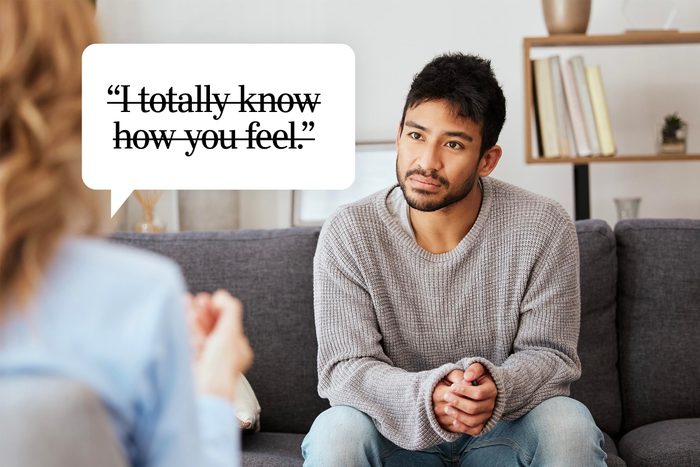
Assuming you know how they feel
There’s a fine line between empathy and hijacking someone else’s experience. “Even if you have been diagnosed with the same thing as someone else, your experience of it will still be different,” explains Bhasin. “Assuming it’s the same for them can be hurtful.”
If you share a similar mental-health challenge, there can be a special camaraderie, humor and bonding in talking about it, but even then, steer clear of saying, “I know how you feel.” You can share your own experiences; just be careful to avoid one-upmanship, says Jenkins.
Say this instead: Focus on validating their experience, says Dr. Rabin. Let them tell you how they feel, and then mirror their language back to them. Try something like: “I hear you saying that you’re having a lot of dark days—what does that feel like for you?” If you do relate to them, simply say that: “That’s so relatable” or “Wow, do I feel that!” Whether you’ve had a serious conversation or not, it can be a nice gesture to follow up the next day with a “thinking of you” message.
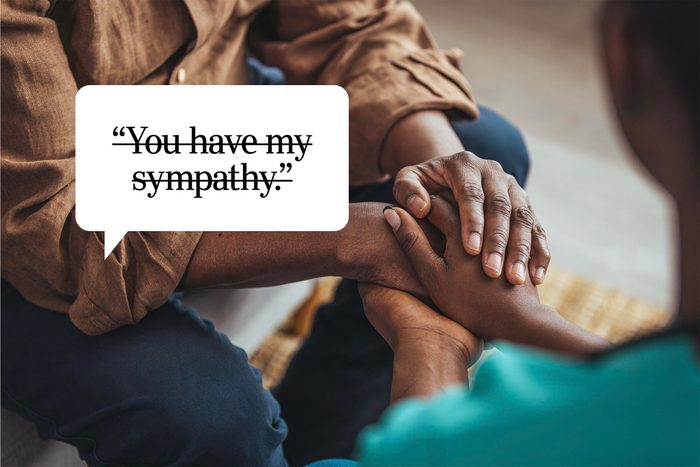
Offering your sympathy
“You have my sympathy” has been a go-to for people wanting to convey caring and love in a respectful, noninvasive way. And while it’s not the worst phrase on this list, it’s simple to learn a different way of expressing that same sentiment. “You want to show you are sympathetic to their mental-health challenges, but these days, sympathy can come across as minimizing or patronizing,” says Bhasin.
“It feels a little bit like the ‘thoughts and prayers‘ trope,” says Jenkins. “Kinda meaningless and, depending on the person, inauthentic.”
Empathy is still a great word to use, but remember that it is reserved for experiences you share, so unless you also share similar mental-health challenges, don’t use this one either.
Say this instead: “Thank you for sharing that with me” or “My heart goes out to you” are both better alternatives, says Dr. Rabin. Another option: “I see you hurting. How can I help?”
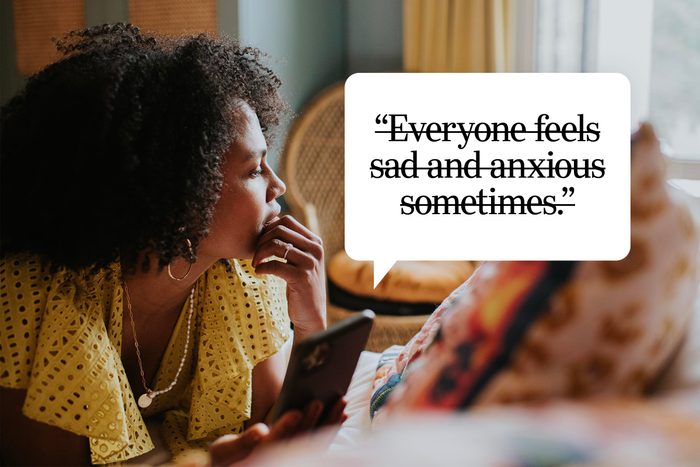
Minimizing the severity of their problems
While it is true that everyone feels a range of different emotions, they only become mental illness when they directly affect your ability to live your normal life, says Dr. Rabin. And there’s a big difference between having some difficult days and feeling so overwhelmed by sadness or anxiety that you can’t work, take care of your family or enjoy your life. “Saying this often comes across as dismissive and can be harmful to the process of what that individual needs in the moment,” Dr. Rabin says.
So, yes, everyone does get sad and worried—but not everyone gets so sad or worried that they can’t function. Sound familiar? Use these tips to manage anxiety and panic disorder.
Say this instead: “I’ve never experienced what you’ve been through, but I would like to hear about your experience with depression if you want to talk. If you don’t feel like talking, I’m happy to just sit here and be with you, if you like.” This is something good friends do.
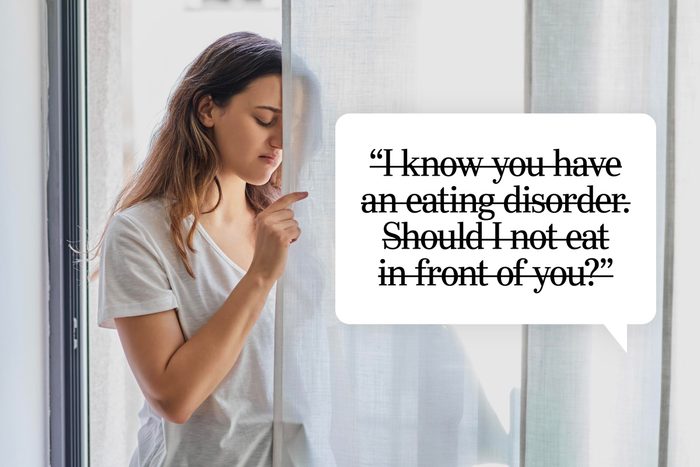
Anticipating possible challenges
Trying to anticipate a loved one’s practical challenges that stem from their mental health can be a great act of kindness—as long as it isn’t based on incorrect assumptions. “Even if you know someone is living with a mental-health challenge, don’t assume they aren’t well,” Bhasin says. “And if you don’t know, you should not ask. Wait for them to tell you if they want to.”
“When I was in recovery from my eating disorder, my boyfriend really wanted to help, and while I appreciated him looking out for me, his constant comments made me feel on edge and embarrassed,” says Mariah Lee, a 19-year-old who has lived experience with anorexia. “He was always trying to manage me, whether it was bringing me snacks everywhere, telling people not to offer me certain foods or refusing to eat in front of me so I wouldn’t feel triggered.”
Say this instead: “I don’t want to assume, but if anything about this feels challenging today, just let me know what I can do to support you, and I’ve got your back.”
One important note: This is not true for someone who is a danger to themselves or others. In those situations, you should take steps to help them immediately.
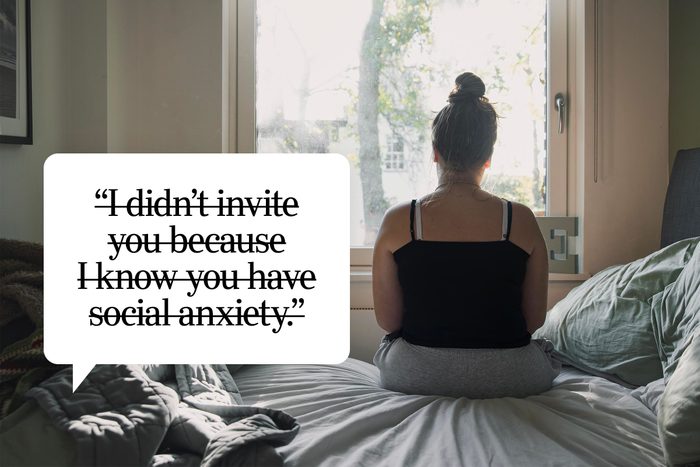
Not putting them in a potentially uncomfortable situation
A person’s mental illness doesn’t define them. Moreover, it exists on a spectrum and can be better or worse depending on the day, says Dr. Rabin. You can be sensitive to what someone is going through, but it’s important not to assume how they will act or what they will want based on their mental-health challenges.
“When I couldn’t make it on a work outing, my boss was immediately like, ‘Oh, right, you wouldn’t come because you’re depressed and you don’t like doing things in big groups,’ but it was actually just a scheduling conflict,” says Alexander. “And nothing about my depression means I don’t like being around people!”
Say this instead: Rephrase this as a question and don’t assume the other person wouldn’t want to be included. That’s a definite etiquette mistake. For instance, in Alexander’s case it would have been more helpful if her boss had simply asked, “I’d love for you to come to the work retreat—is there anything I can do to support you in attending?” Or if you’re speaking to a friend: “Hey, we’re getting together this weekend. Would you want to join us?” The important part is not to judge or cajole them for their answer, says Dr. Rabin.
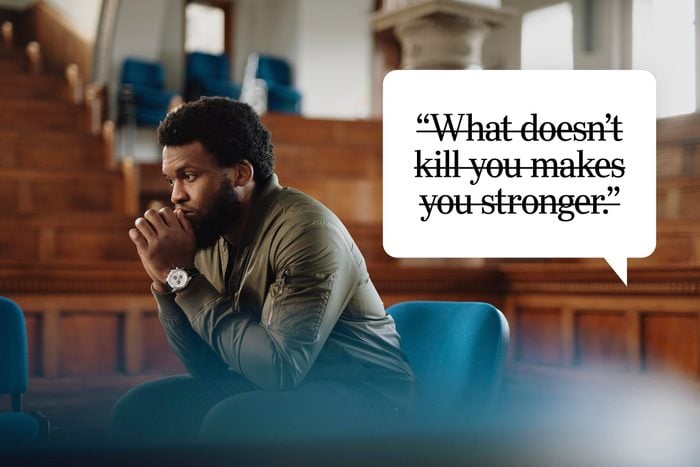
Offering hopeful sayings
“After rain, comes the rainbow.” “Every cloud has a silver lining.” “Everything happens for a reason!” We could go on, but we’ll stop there. A common reaction to hearing other people’s challenges is to offer a hopeful or inspiring comment, but these insta-memes can come across as minimizing, patronizing and simplistic, says Bhasin. “This is more about you not wanting to feel uncomfortable and less about helping them,” she notes.
“I don’t feel stronger from my experience at all,” says Anderson. “In fact it kind of broke me, and having people tell me that I should be stronger somehow makes me feel like I’m failing or something.” Here’s how to set boundaries if people are unintentionally hurting your feelings with these phrases.
Say this instead: “That sounds so painful. I’m sorry you’re going through this. How can I support you right now?” Listen to their feelings, and don’t try to “fix” them with these types of sayings, says Bhasin.
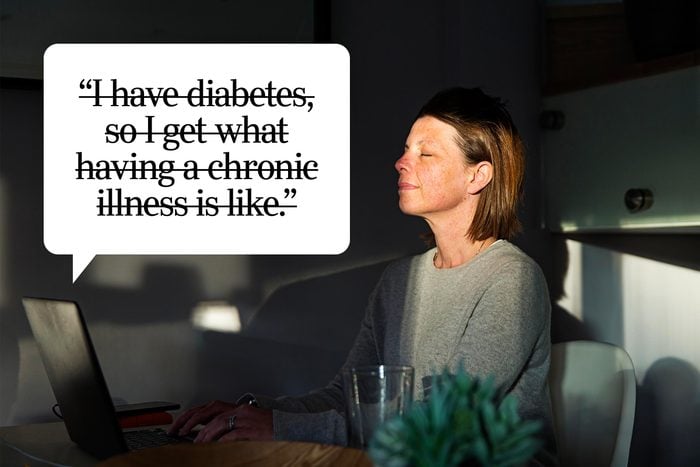
Relating your health issues to their mental-health challenges
Comparing a mental-health challenge to a non-mental-health challenge is apples to oranges, and while you may be trying to find a way to connect, a bad comparison is more likely to make the person feel disconnected from you, says Bhasin. This doesn’t mean your experiences are invalid—living with diabetes or cancer or gambling debt can all be incredibly difficult experiences—but it doesn’t make them relevant to this particular conversation.
Say this instead: “I’ve never experienced PTSD, but it sounds really difficult. What’s something you would like me to understand about it?” If you don’t understand what someone else is going through, say that. Depending on your relationship with the person, you can also ask questions, which is one of the therapist secrets that pro counselors use.
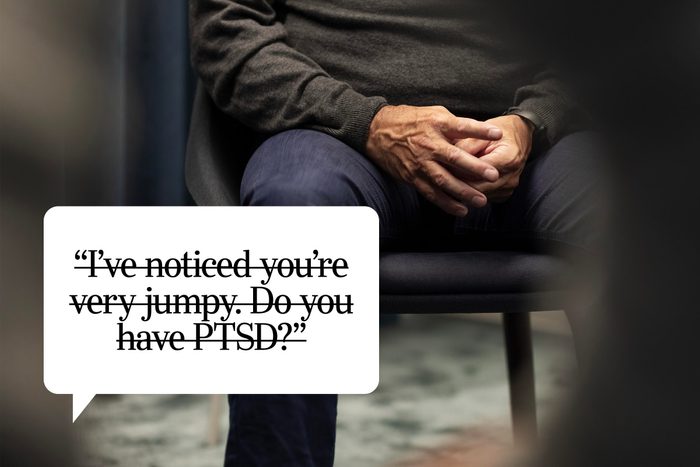
Asking if they have a specific condition
Even if you suspect a loved one or acquaintance has an issue, you shouldn’t call it out or play Dr. Phil. Questions like this can feel intrusive, especially if someone isn’t ready to share. “I have PTSD from finding a loved one after they ended their life, and unfortunately sometimes the PTSD does get triggered in my daily life,” says Almeria Anderson. “But it never helps to have someone point it out or try to diagnose me, like why I’m crying in certain situations. I have a great trauma therapist—that’s his job.”
Say this instead: “I can see you’re upset. Do you want to talk about it, or should I change the subject?” Anderson says that a good friend said this to her after she randomly burst into tears at the gym, and then jokingly offered to moon the group to create a distraction so the attention wouldn’t be on her. “It was honestly the nicest thing,” she says.
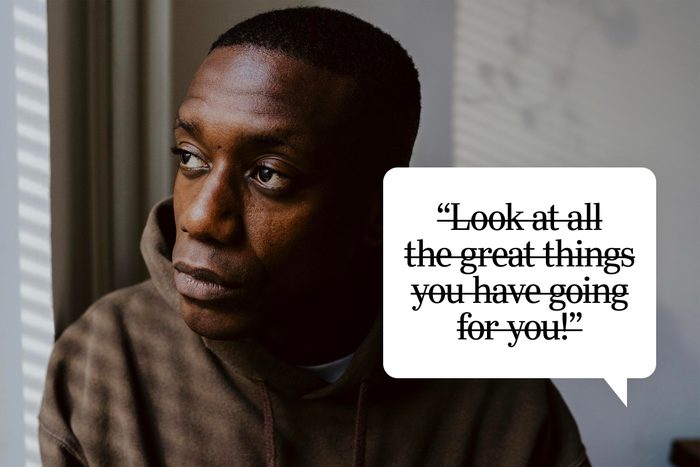
Trying to put things into perspective
When someone is telling you what’s wrong in their life, it can be oh-so-tempting to offer the opposite perspective by pointing out all the things that are good in their life. But this can come across as invalidating and make them feel embarrassed or ashamed of their normal emotions, says Bhasin. And while having an optimistic outlook can be a powerful tool in dealing with mental health challenges, it generally needs to come from the person themselves or by working with a trained counselor, says Dr. Rabin.
“If I could just choose to ‘get over it,’ I would have by now,” says Jenkins. “Telling me not to ‘worry so much’ isn’t a magic wand that stops the anxiety.”
“My husband said to me, ‘Yes, this person died, but look how many of us are alive here with you. Focus on that,'” says Anderson. “I understood the sentiment, but in the rawness of my grief, it just hurt. I can do both—miss my loved one who died and intensely love all those who are still with me. It’s not either/or. Just because someone is sad doesn’t mean they can’t also be grateful.”
Say this instead: “Thank you for sharing your feelings with me. I’d be honored to sit in this moment with you and just listen.” Above all, says Dr. Rabin, let them know they’re allowed to feel that way. “Instead of pointing out all their blessings, just listen nonjudgmentally.”
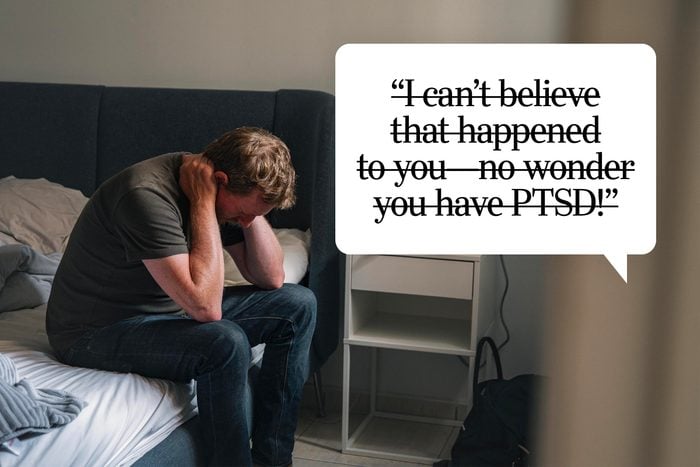
Expressing disbelief at the difficulty of a situation
When you say you can’t believe something happened, you may feel like you’re validating the other person’s feelings and commiserating with them—after all, of course you know it happened—but it’s not the right way to go here. This was a sentiment that Anderson said she heard a lot after her loved one’s suicide, and it was particularly painful. “Again, I know people meant well, but it made me feel ‘outside’ or ‘othered,'” she says. “I know that my experience is relatively rare, but saying you can’t believe it’s real makes me feel bad. My real life isn’t ‘real,’ I guess.”
The other person’s lived experiences may be so far out of your personal experience that you can’t (or don’t want to) believe they really happened, but expressing disbelief is invalidating and can make them less likely to reach out for help. Even if you don’t literally mean “I don’t believe you,” saying this still isn’t the best way to be supportive.
Say this instead: “What a horrible thing to have gone through. I’m so sorry.” Tone is everything when it comes to this kind of statement, says Bhasin, and a statement like this can avoid any potential misunderstandings.
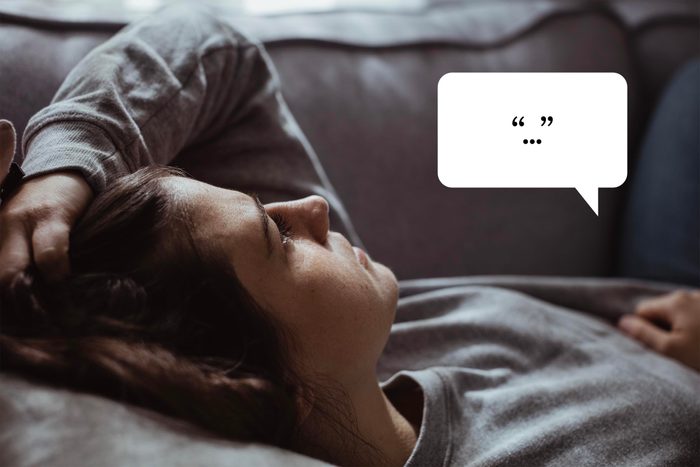
Saying nothing at all
Many people are so afraid of saying the wrong thing and causing more hurt that they avoid discussing mental health at all, making it taboo. “This silence harms the person living with it, the people around them and society as a whole,” says Bhasin. So if you’ve read through this list and are now worried that saying something will do more harm than good, rest assured that it’s almost always better to try. The key? When figuring out what to say, be gentle, kind and honest. “It’s OK to admit you don’t know the right thing to say, but do say something,” Bhasin says.
Say this instead: “I’m worried about saying the wrong thing, but I just want you to know that I love you and I’m here for you.”
Sources:
- Ritu Bhasin, a belonging and leadership expert, and the author of We’ve Got This: Unlocking the Beauty of Belonging
- Dave Rabin, MD, PhD, psychiatrist, neuroscientist and co-founder of Apollo Neuroscience
